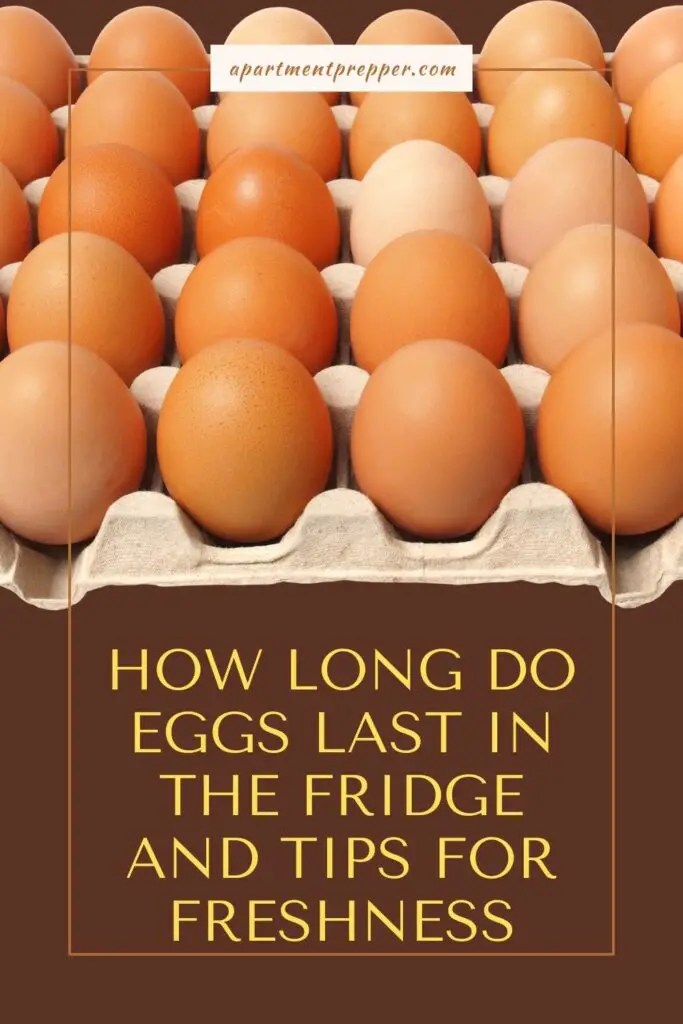Written by Bernie Carr
I read that egg prices may be rising again due to a spike in the Avian flu. You may remember last spring when egg prices were way up, and I was seeing $5 plus per dozen. Fortunately supplies went back up, but now I heard that there is a chance prices will rise again as more chickens get hit by Avian flu. If you decide to increase your egg supply, you may wondering how long do eggs last in the fridge.
In this article, we’ll explore the factors affecting egg freshness, storage tips, and guidelines to help you make the most of this kitchen essential.
Understanding Egg Freshness
Proper storage is the key to keeping eggs fresh. Eggs have a protective coating called the “bloom” or “cuticle,” which helps preserve their freshness. When eggs are washed or exposed to moisture, this coating comes off, making them more susceptible to bacteria and odors. They must be refrigerated once the bloom comes off.
How Long Do Eggs Last in the Fridge?
The refrigerator is the best place to store eggs to maintain their freshness. Uncooked eggs in their shells can last for approximately 4-5 weeks beyond the packing date. However, it’s important to note that the “sell-by” or “expiration” date on the carton can offer guidance but is not a strict indicator of freshness. Performing a simple water test can help assess an egg’s viability – fresh eggs sink, while older eggs may float.
Storage Tips for Extended Freshness
- Choose the Freshest Eggs: When shopping for eggs, inspect the carton and find the Sell or Use By Date. Choose the eggs with the farthest Sell or Use By Dates. You may have to reach toward the back of the shelf in the market.
- Store in the Carton: Keep eggs in their original carton to protect them from absorbing odors from other foods in the fridge. The carton also helps maintain a consistent temperature.
- Avoid Temperature Fluctuations: Keep the fridge temperature consistent to prevent eggs from contracting and expanding, reducing the risk of bacterial contamination.
- Refrigerator Placement: Store eggs on the refrigerator shelves rather than the door, as the door is subject to temperature fluctuations when opened.
- Check for Cracks: Inspect eggs for cracks before storing them. Cracked eggs are more susceptible to bacteria.
- Be aware of the Use-By Date: While the “use-by” date is a helpful guideline, it’s essential to consider other factors, such as storage conditions and the water test, to ensure freshness.
- Keep Away from Strong Odors: Eggs can absorb odors from nearby foods. Store them away from strong-smelling items like onions or fish.
- Coat them with Mineral Oil: Use food grade mineral oil*, found in the first aid section of a pharmacy or even the grocery store, next to stomach remedies. Just rub all over the egg and return to the carton. I tested this and it worked (even when the eggs were not in the refrigerator).
Understanding how long eggs last in the fridge and implementing proper storage practices can significantly contribute to maintaining their freshness and quality. By following these tips, you can confidently use eggs into your weekly menu, knowing they are both safe and delicious. So go ahead, stock up on a few dozen eggs before prices go up again.
*We are an affiliate of Amazon.com, which means we received a small commission if you click through one of our Amazon links when you shop, at totally no cost to you. This helps keep the lights on at the blog. Thanks!
About the author
Bernie Carr is the founder of Apartment Prepper. She has written several books including the best-selling Prepper’s Pocket Guide, Jake and Miller’s Big Adventure, The Penny-Pinching Prepper and How to Prepare for Most Emergencies on a $50 a Month Budget. Bernie’s latest e-book, FRUGAL DIY has just been released on Amazon. Her work appears in sites such as the Allstate Blog and Clark.com, as well as print magazines such as Backwoods Survival Guide and Prepper Survival Guide. She has been featured in national publications such as Fox Business and Popular Mechanics. Learn more about Bernie here.
FB: https://www.facebook.com/apartmentprepper
Instagram: https://www.instagram.com/apartmentpreppers/
Twitter: https://twitter.com/AptPrepper
YouTube: https://www.youtube.com/channel/UC7vOtdbo-wiBeBxD6puCr1Q
Patreon: https://patreon.com/apartmentprepper
Pinterest: https://www.pinterest.com/aptprepper/
Today’s societal climate not supportive of prepping. With your help, we can keep bringing you content that is often suppressed. Help keep Apartment Prepper alive.
Join me on Patreon for ad-free content.

Or Help out via Paypal



